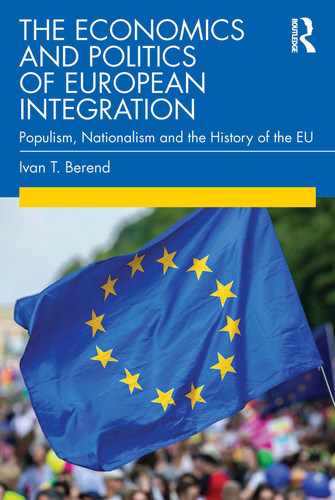The Economics and Politics of European Integration offers a comprehensive history of European integration, from the conceptualization of a United States of Europe, to the present day. The special role of the United States in this process of integration, and the expansion and evolution of the European Union, is critically analyzed. The book also thoroughly discusses the current view of the EU and the complex crises emerging from the COVID-19 pandemic.
While the book focuses primarily on Europe, the role of other countries is also examined. The rise of hostile enemies from Turkey, Russia, the US and China is explored, and the history and outcome of Brexit also receives unique focus. Maps are used throughout to clearly depict the enlargement process. This illuminating text will be valuable reading for students and researchers across international economics, economic history, political economy and European studies.
Table of Contents
- Cover
- Half Title
- Title Page
- Copyright Page
- Dedication
- Contents
- List of illustrations
- A personal introductory note
- 1 The new postwar economic and political world order: the ground paved for European integration
- War devastation
- The collapse of colonial empires
- A return to normalcy ?
- Rebuilding the postwar capitalist economic regime: welfare capitalism
- Building the free trade system and international institutions
- American assistance to Europe
- Rearranging the postwar world: the rising Cold War regime
- The bomb and the nuclear arms race
- Cold war crises of 1948-1950: close to a World War III
- Forming the new Cold War political world order
- A new solution to the “German Question”
- The plan for a joint Western European army
- 2 Federalist dreamers and pragmatic integrationists: the conceptualization and first steps towards a United States of Europe
- The idea of a United States of Europe
- American plans and efforts to Unite Europe
- New American integration plans: looking for a European leader
- The failure to convince Britain
- Successfully blackmailing France
- American successes, pragmatic European politicians: the coal and steel community
- Deciding how to go further
- The impact of integration on economic recuperation
- The first crisis and curbing further integration
- 3 The main institutional structure and policy agendas of the European community
- 4 The new challenges of globalization and global political disorder – Europe's answer: regionalization (the 1980s-1990s)
- The globalized capitalist world economy and the technological revolution
- Neoliberal theory and policy
- America and Asia conquer huge parts of the European markets
- The rearranged world political order
- Civil wars, coups and regime changes
- Lack of hegemony and global governance
- Economic crisis and mistaken answers
- Concerted European policy needed
- Big corporations for European cooperation
- Renewed leadership: Mitterrand-Kohl-Delors and the single Europe act
- Regionalization: the answer to globalization and the Maastricht Treaty
- 5 Four decades of permanent enlargement of the union and its dangers
- The first enlargement in 1973
- The 1980s: the American alliance with Mediterranean dictatorships and the second wave of enlargement
- The 1990s: third wave of enlargement
- The end of the Cold War: a new opening towards the East
- The 2000s: the fourth enlargement wave, three groups of potential members
- Central Europe and the Baltics: thirteen countries join
- The postponed acceptance of the West Balkans
- The case of the western former Soviet republics
- Watch out Europe, reconsider further enlargement
- Epidemic corruption in the Balkans
- 6 The triple crises and escaping ahead: 2008-2020
- The economic recession of 2008
- Financial-economic crisis in Europe
- Collapse of the euro currency?
- “The Euro is Already Saved!”
- Escaping by running ahead: the euro-zone
- Migration crisis, 2015-2016
- Against a new pressure of migration
- The COVID-19 crisis
- Escaping by running ahead: coronabond?
- Escaping by running ahead: steps towards military integration
- 7 Disappointment and anger: the rise of anti-EU populist nationalism
- 8 An increasingly hostile international environment
- 9 Conclusion: the socioeconomic achievements
- Index
